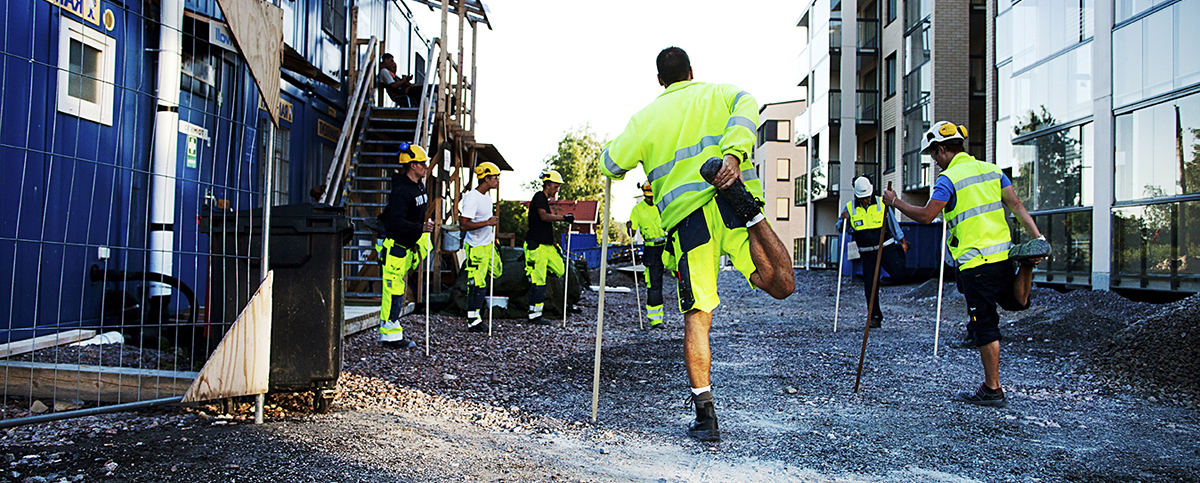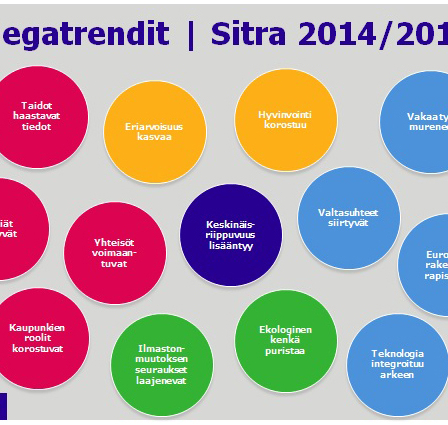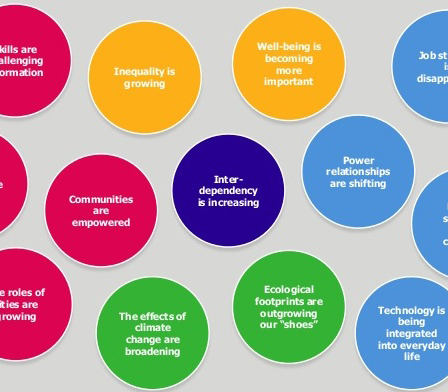It seems well-being is very fashionable at both an individual and a societal level, and new ways are being identified of embedding well-being in working life.
January – the peak season for health improvements and lifestyle changes. Year after year, we make New Year’s resolutions and fall for healthy lifestyle campaigns. However, the current well-being trend goes beyond having a dry January or a post-Christmas detox, and is visible at both an individual and a societal level. A food culture based on the adage ”you are what you eat” is thriving, gym exercise and endurance sports are popular, wearing trainers is no longer regarded as a fashion faux pas, and people share their accomplishments on social media through apps such as Sports Tracker and HeiaHeia.
There is a growing thirst for personal health and well-being information. Activity-tracking smart watches have found their way onto many people’s wrists and genetic testing is becoming more common in Finland. The well-being trend is also visible in our export sector: health technology is now the largest segment in high-technology exports from Finland. The health technology markets are expected to keep growing. More evidence of the popularity of the health and well-being industry is presented in a report by the Ministry of Employment and the Economy, according to which there are more early-stage growth companies in the sports sector than in any other.
Well-being enters the workplace
Meaningful work itself promotes individual well-being, but well-being at work can also be improved in numerous other ways. Workplaces are full of examples of how to ensure that employees stay healthy. Standing desks, walking meetings and staff sports days are featured in a growing number of workplaces and employees are being encouraged to maintain an active lifestyle through financial support and flexible working times.
An individual’s experiences at work and in working life affect not only their mental and physical well-being, but also the well-being of friends and family and, ultimately, the whole of society. The employment rate and length of career play an important role in maintaining our welfare society. Healthy employees have longer working careers.
Well-being at work has major financial benefits. Organisations that take well-being seriously are aware of its links to the commitment and job performance of employees, and to customer satisfaction. Software giant SAP reckons it saves 62 million euros each time it increases employee retention by just 1%. Researchers on strategic well-being have estimated that Finnish companies invested a total of 1.8 billion euros in well-being at work in 2014. This seems like a large sum, but it is small in relation to the national improvement targets for well-being at work and the costs arising from lost labour input.
Is more flexibility and mental exercise needed?
The concept of well-being at work in today’s society is based on a holistic approach that emphasises social and personal resources. Job performance and commitment to one’s work should be considered as a whole, with a key element being psychological well-being. Work and leisure time, and the professional and personal are becoming more and more entwined. Reconciling work, family and other daily roles and activities can be a major cause of stress. The Best Workplaces in Europe list, which acknowledges firms for their efforts to ensure well-being at work, emphasises individuality and flexibility. Employee benefits are tailored to suit different life situations. The employers that made it onto the list invite family members to staff social events, provide childcare services and playrooms in the workplace, or even offer romantic advice for resolving personal problems.
Changes in working life, such as technological development and the internationalisation of the markets, are a source of new opportunities. However, they are also making working life more hectic, fragmented and information intensive, while increasing the pressure to perform well. All of this is affecting a wider group of people than before. Tolerance of being halfway done and of a less than perfect job have become key skills for coping in working life.
To cope with the specific load that working life places on our brain and mental resilience, we need a better understanding of the brain’s information ergonomics, cognitive skills and information-processing mechanisms. When emails keep flooding into your inbox after working hours and something new lands on your desk before you can finish what you are doing, self-management skills are clearly at a premium. Today’s working life is creating a market for mindfulness and relaxation exercises. In working life in particular, this market has been boosted by studies on the effects of mindfulness exercises on brain activity. In the future, we may focus on keeping our brains healthy as much as we currently worry about maintaining our physical condition.
The drawbacks of the well-being trend
The dark side of the well-being trend has been termed the wellness syndrome. In working life, the potential downside lies in the possibility that attending solely to the personal health or lifestyles of employees will undermine the basic elements important to maintaining well-being at work, such as the way work is organised, allowing employees to influence their working tasks, and fair management practices. In the worst-case scenario, placing too much emphasis on health and idealising certain external criteria, such as physical activeness, could increase inequality among employees. According to a report of the Ministry of Employment and the Economy, state of health is the most common cause of discrimination in working life.
A trend in Finnish well-being and working lives?
Do investments in well-being improve the health and job satisfaction of employees? According to a survey of the National Institute for Health and Welfare (THL), Finnish people are now healthier and feel better than ever before.
On the other hand, Finland is still home to major health inequalities. The health gap between the working population and the unemployed, and that based on socio-economic status, are the most prominent examples. Income level affects issues such as the use of medical services: higher-income people visit a doctor more often than lower-income people. Occupational healthcare services are a major contributor to health inequalities. In most cases, the unemployed, freelancers, the self-employed and temporary workers are not entitled to use occupational healthcare services. With careers becoming ever more fragmented and various unconventional ways of working becoming more common, other areas of society and working life also need to change.
According to Statistics Finland’s Quality of Work Life Survey 2013, there have been positive developments in the working life in recent years, despite the rise in the level of uncertainty. Working conditions have improved in general, but areas such as the healthcare sector need innovations in order to make work less physically strenuous.
Aiming for the best working life in Europe
Although the importance of leisure time is often emphasised, paid work is seen as a key part of life, despite the new challenges it involves. The national target is to make working life in Finland the best in Europe by 2020.
So, what is the state of Finnish working life now?
Margita Klemetti is a project leader for the Ministry of Employment and the Economy’s Working Life 2020 project. She says that Finnish working life is already faring well in comparison to its European counterparts. In particular, competences, learning and the opportunities for receiving training are top quality by European standards. Finland is highly supportive of innovation and workplaces keep a close eye on new ideas. Finnish employees also have more say than their counterparts in many other European countries. Reasonable working hours and flexitime – a system permitting flexible working hours – help employees to reconcile work with family life.
To achieve this ambitious target, Finnish working life needs to be developed further. Klemetti notes that we need more co-operation and interaction in support of innovation and productivity. In addition, our fast pace of work means that employees need to be allowed some say in the way they do their work. Harassment and bullying appear to be more common in Finland than on average in Europe. Equal treatment of different employee groups remains a challenge.
However, according to Klemetti, some positive development has occurred. This is indicated by national surveys: opportunities for learning and development on the job have improved in the 21st century. In recent years, there has also been positive development in the workplace atmosphere and social relationships. Satisfaction with management has also improved slightly.
“To have the best working life in Europe, of course we need to identify the problem areas, while holding on to and developing those areas that function well and remembering that this is important in the midst all the changes recently implemented in such rapid succession,” says Klemetti.
Read more:
Emerging Trends in People Management
Terveystrendi tuli työpaikoille (Helsingin Sanomat 7 September 2014)
From cut-price gym fees to stop-smoking programmes: The dark side of staff health schemes.
Mitä tapahtuu huomenna [työnantajuudelle]? Ellun Kanat
Juha Mikkonen: Terveyden tasa-arvon tulevaisuus. Demos Helsinki/ Briefing, 2015
Published earlier in this series:
Skills will challenge information
Stable employment becoming a thing of the past
Europe’s structures are crumbling
The effects of climate change are spreading outwards







Recommended